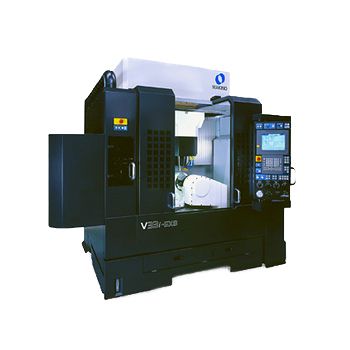Technical Specifications
Table: 200 mm diameter
X: 650 mm Y: 325 mm Z: 350 mm
Die and mold shops seeking a full 5-axis simultaneous milling answer for intricate 3-D shapes can now look towards the Makino V33i-5XB. Drawing upon years of experience in machine design and precision engineering, this vertical machining center from Makino is the newest market solution for die/mold applications.
An in-depth knowledge of such die/mold requirements led Makino to design a special tilt-trunion table with combined B- and C-axes. This table on the V33i-5XB provides the highest accuracies and repeatability available in the industry, with less lost motion and higher stiffness and rigidity than comparative 5-axis machines.
The V33i-5XB provides one-setup access to complex, multiple-sided parts, reducing handling and costs. It also facilitates access to undercut areas, oddly positioned features and complex geometries—all with optimum, shorter tool lengths.
This creates the best tool life and surface finish characteristics in the marketplace. The machine can also be used in the more traditional “3+2” mode for blending and matching complicated multi-plane surfaces typical of die/mold production.
The V33i-5XB vertical machining center incorporates a number of design features specifically designed to increase precision and maintain it for the long periods of time typical of most die and mold applications. With X- and Z-axes on the spindle and Y-axis under the table, the machine construction provides superior performance in a compact package. Designed with no overhangs or unsupported areas, the V33i-5XB delivers outstanding accuracy over the full range of the machine. Painstakingly polished to a precision finish, the guideways are integral to the machine castings to provide superior stiffness, rigidity and precision.
To ensure consistent accuracy over long cycle times, the V33i-5XB machine is equipped with the following features:
- Core-cooled ballscrews on all axes, including temperature control of the bearings support bracket area and motor mounting area to maintain component temperatures.
- Temperature control of the machine saddle and spindle carrier using oil passageways and temperature-controlled oil, ensuring tight control over saddle and carrier temperatures.
- Addition of a separate oilmatic unit for tight temperature control of the machine elements.
- Guideway hydraulic circuit (Nano Slideway) on the X-axis to reduce friction and heat generation, yet also maintain stringent control over geometries and accuracies.
The V33i-5XB spindle features Makino’s unique core-cooling and under-race lubrication system, minimizing thermal distortion at high spindle speeds. Integrated construction of the spindle and drive motor rotor reduces vibration during high-speed operation. The spindle design also incorporates the following:
- A shorter, stiffer, more rigid spindle design that ensures even greater stiffness, minimizes vibration, improves rigidity and ensures chatter-free cutting.
- Increased fluid mass flow through the spindle to reduce, even further, spindle thermal growth, facilitating tighter control over temperature within the spindle.
- The shorter spindle design and heightened temperature control permit a tightening of the spindle tolerances, reducing runout and increasing stiffness and rigidity.
In addition, the V33i-5XB is outfitted with the Makino Professional 6 control providing a stable, secure platform with reliable performance on the NC side, while providing an operator-friendly graphical user interface (GUI). This latest generation machine tool control offers large color touch-sensitive, on-screen, menu-driven applications. Icons provide “hot links” and quick access to critical information that may be required by the operator. In addition, the new control platform provides all of the functions typical of a PC (cut, paste, copy, find, replace, etc.) that are rarely available on a machine tool control. Advanced data management technology and Makino’s proprietary, next-generation Super Geometric Intelligence (SGI.5) servo control deliver the lowest cycle times achievable by reducing machining cycle times on dies, complex cavities and cores by as much as 40 percent when compared to most other control technologies.




